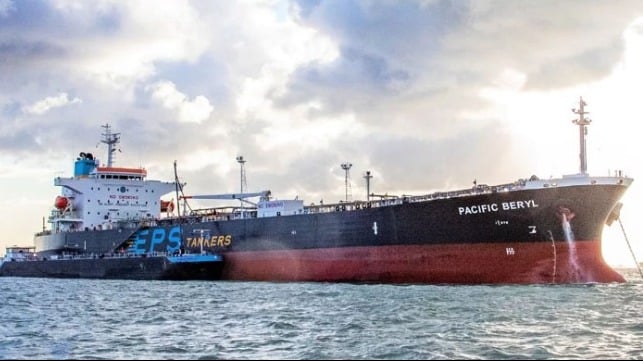Additional Shipping Lines Successfully Tested Biofuel Alternative

Two additional shipping companies, ONE and Eastern Pacific Shipping, recently completed successful trials of biofuels on their in-service ships. The attraction of biofuels, which is made from waste and residue stream materials such as used cooking oil, comes from the fact that it can be used with existing propulsion systems and while not an absolute solution provides a near-term alternative to reduce emissions from a broad range of ships.
Ocean Network Express (ONE) carried out its test working with Mitsui O.S.K. Lines loading biofuel supplied by GoodFuels in the Netherlands aboard the 62,953 dwt MOL Experience, a 14-year-old boxship that has a carrying capacity of 4,800 TEU. The fuel was loaded in Rotterdam in November with the test being conducted as the vessel made a trans-Atlantic crossing.
Similarly, Eastern Pacific’s 47,377 dwt crude oil tanker Pacific Beryl, which is an 11-year-old ship, also loaded 254 metric tons of biofuel in Rotterdam from GoodFuels. Carrying a cargo of 41,000 metric tons, the MR tanker sailed an 11-day Atlantic crossing using the biofuel to power its main engine.
Speaking at an IMO Symposium on alternative low-carbon and zero-carbon fuels, Cyril Ducau the CEO of Eastern Pacific details the test including the preparations and results. Ducau discussed EPS’ investment in alternative fuels, ranging from LNG to LPG and ethane, exploring dual fuel vessels in an effort to do what they can to reduce emissions now while taking into account the operational and commercial limits.
The highlights of the biofuel test and its results were that the tanker completed the crossing with no noticeable difference in engine performance. CO2 emissions were reduced by 70 metric tons per day achieving zero emissions from the main engine and negligible overall emissions as conventional fuel was used for auxiliaries.
The two downsides to the use of the biofuel included a 10 percent high consumption, which Ducau attributed to the lower viscosity, pour value, and calorific value of the alternative fuel. Also, when asked, he acknowledged a higher NOx (nitrogen oxides) emission with the biofuel although he said they were still awaiting data from the engine manufacturer MAN.
Several challenges were also cited in preparing for the use of biofuel. Eastern Pacific worked with the crew aboard the tanker to prepare them to handle the alternative as well as with their flag state, classification society, and engine manufacturer. They also had to clean the tanks on the vessel to prepare for the fuel and ensure that there were no contaminants in the fuel system.
“There is no perfect solution today,” said Ducau talking about alternative fuels. He said, “We should not let the perfect be the enemy of the good in this quest,” noting that companies would otherwise standstill not contributing to the ongoing efforts to lower emissions. Highlighting the 100 percent sustainable nature of biofuel and the ability to use it with older, existing ships, Ducau was positive on the results of the trial with the considerations of price and availability weighing on future use.
ONE also reported a positive result from its trial voyage. “The success of this trial led to the verification of the availability of various leading alternative marine fuels,” said Michihiko Nakano, General Manager of Bunker Business Division of MOL.

that matters most
Get the latest maritime news delivered to your inbox daily.
Biofuels are considered to be carbon-neutral because the carbon dioxide that is absorbed by the source of the biomass is equal to the carbon dioxide released when the fuel is burned, ONE notes. Biofuels are virtually free of sulfur oxides and deliver 80 to 90 percent “well-to-exhaust” C02 reductions versus fossil fuel equivalents, according to GoodFuels.
Recently, MSC announced that it would also begin trials on biofuels as it explores alternative fuels and both Volkswagen and BMW announced that the car carriers transporting their vehicles would begin using biofuels. Last spring, Stena Bulk completed a 10-day trial voyage, using biofuels aboard the 50,000 dwt MR tanker Stena Immortal and later announced that based on availability it would begin integrating biofuel into its operations.
